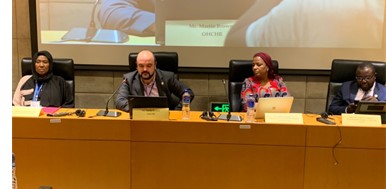The discussion surrounding the distribution of benefits under the African Continental Free Trade Area (AfCFTA) was moderated by Martin Browne from the Office of the United Nations High Commissioner for Human Rights (OHCHR) during our NGOs Forum preceding the 81st Ordinary Session of the African Commission. Browne characterized this topic as both important and dynamic, highlighting that the AfCFTA is one of the largest free trade agreements globally. Over 40 African nations are either developing or implementing national strategies to ensure its success. He emphasized the AfCFTA’s potential to promote inclusive trade across Africa, particularly focusing on enhancing the well-being of women, as outlined in various protocols.
Trade and Human Rights: Perspectives from The Gambia
Mr. Lamin Dampha, Permanent Secretary at The Gambia’s Ministry of Trade, articulated a strong connection between trade and human rights, asserting that sustainable development hinges on effective trade utilization. He pointed out that Africa’s underdevelopment is largely due to its failure to leverage trade effectively. Citing Agenda 2063 from the African Union, he underscored that trade is central to Africa’s developmental goals. The Gambia became the 22nd country to sign and ratify the AfCFTA, actively developing a strategy focused on private sector involvement.
Dampha identified agriculture, fisheries, information and communication technology (ICT), and tourism as pivotal sectors for driving trade under the AfCFTA. He reported conducting over ten workshops aimed at raising awareness about the agreement. He noted that the AfCFTA could create job opportunities, potentially reducing youth migration risks across the Mediterranean. He also highlighted strategies to facilitate women’s participation in trade, while acknowledging challenges such as unresolved complaints regarding border issues.
Efforts are underway to provide tariff information regionally and train border officials on AfCFTA protocols. Dampha addressed women’s concerns about extortion and harassment at borders through ongoing dialogues. He advocated for digital payment systems and an African passport to ease mobility, reiterating that the AfCFTA seeks to address challenges posed by multinational corporations.
Empowering Women and Youth in Trade
Ms. Haddy Dandeh Jabbie, an expert member of the African Commission on Human and Peoples’ Rights (ACHPR), stressed the need to recognize women and youth as integral components of Africa’s economy. She called for an environment conducive to their participation in trade, emphasizing technical skills and financial literacy as vital for sustaining their businesses. Jabbie pointed out existing gaps in policy implementation despite favorable laws like The Women’s Act, urging for stronger structures to enhance access to finance and mentorship.
In response to participants’ concerns about financial access for women and youth, Jabbie criticized policies that inadvertently exclude those most affected by economic challenges.
Bridging Human Rights and Economic Development
Ms. Fatou Jallow, Coordinator of SheTrades West Africa Hub at the International Trade Centre, highlighted their initiatives aimed at raising awareness among women regarding trade opportunities. She pointed out a significant gap between human rights considerations and economic development efforts. The Centre operates on four pillars, including empowering women through training and facilitating access to finance.
Jallow expressed concern over the low percentage of public procurement contracts awarded to women (1%) and emphasized building women’s capacity to seize such opportunities. She also called for increased digital literacy among women to meet contemporary trade demands.
Panel Discussion Insights
During a panel discussion, several participants raised critical issues:
- A participant from The Gambia inquired about how the AfCFTA supports vulnerable groups.
- A Ugandan participant highlighted barriers such as visa restrictions hindering human resource mobility.
- Concerns were raised about multinational companies exploiting young farmers in Kenya.
- An Ethiopian participant emphasized challenges in accessing international markets.
- Discussions also touched on women’s difficulties in accessing finance due to high collateral requirements.
These interventions underscore a collective call for reforms that prioritize inclusivity and equitable access within the framework of the AfCFTA.
The discussions surrounding the AfCFTA reveal a significant intersection between trade policies and human rights education. By fostering an inclusive environment that empowers women and youth, Africa can harness its vast potential for economic growth while ensuring fair participation in its developmental journey. The collaborative efforts among stakeholders will be crucial in addressing existing disparities and maximizing the benefits of this landmark agreement.


